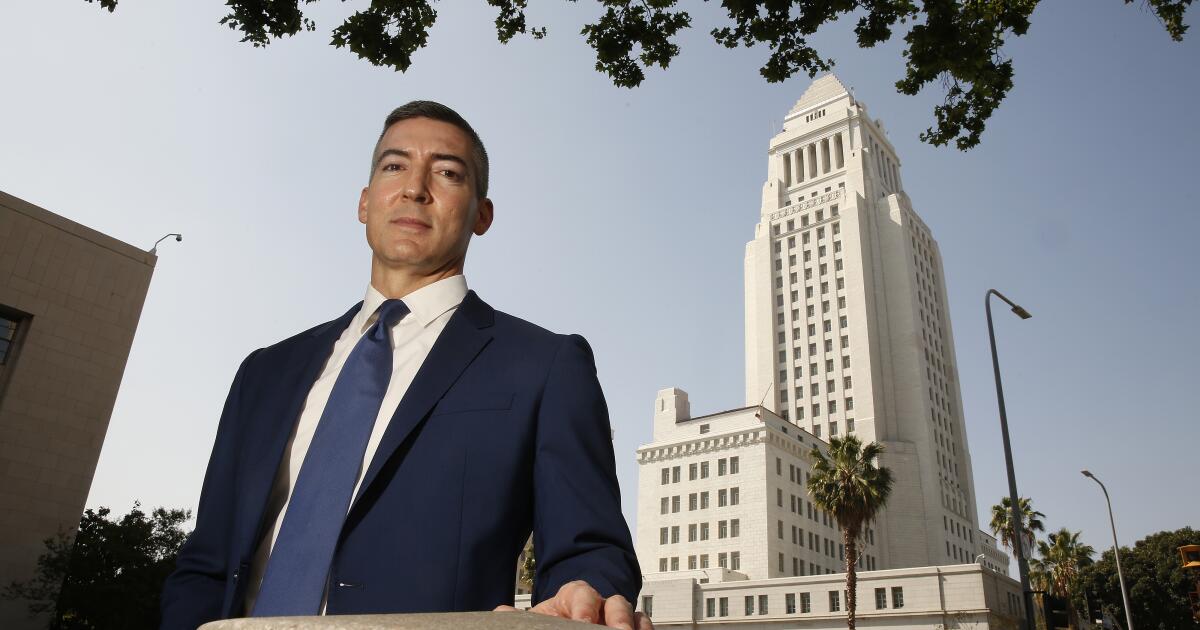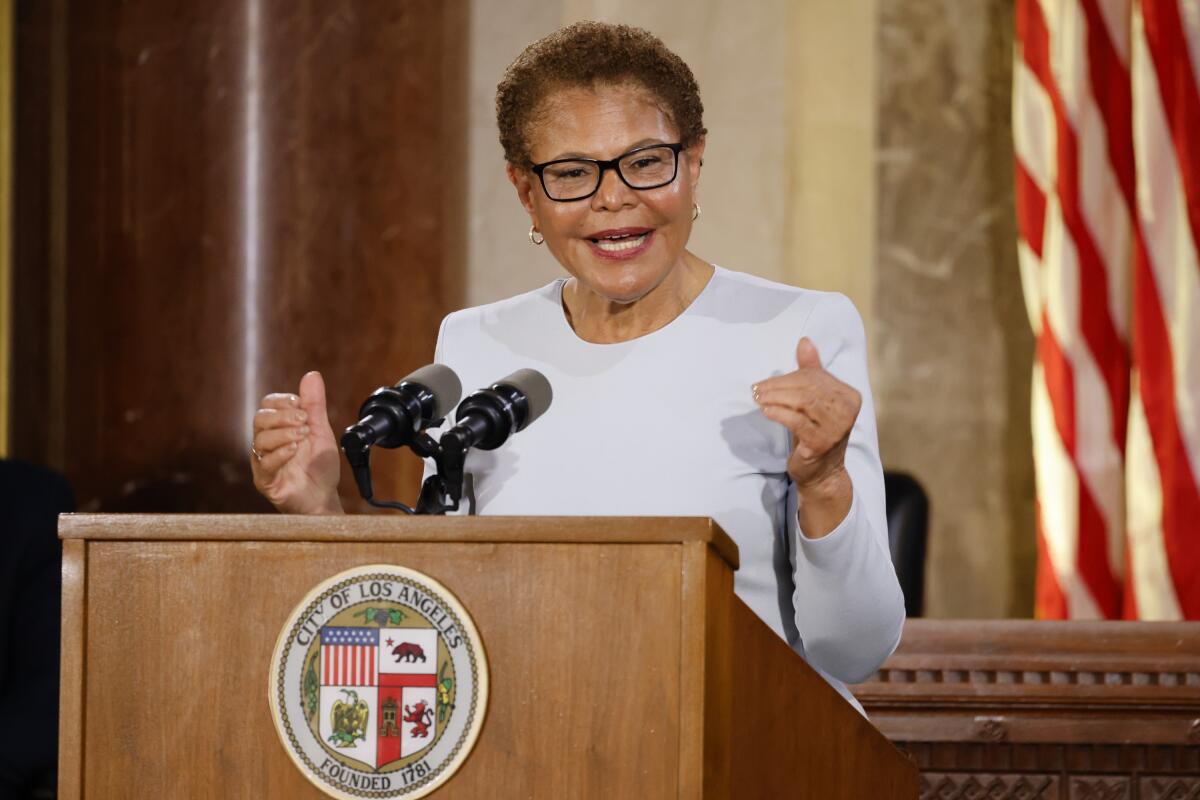What should L.A. politicians call those who cause protest chaos?
Good morning, and welcome to L.A. on the Record — our City Hall newsletter. It’s David Zahniser, with an assist from Julia Wick, giving you the latest on city and county government.
Newsletter
You’re reading the L.A. on the Record newsletter
Sign up to make sense of the often unexplained world of L.A. politics.
You may occasionally receive promotional content from the Los Angeles Times.
L.A.’s Little Tokyo neighborhood was a mess on Monday. Windows were shattered in multiple locations. Graffiti seemed like it was everywhere. State Assemblymember Mark Gonzalez (D-Los Angeles) had had enough.
Gonzalez, who took office in December, had already voiced outrage over the immigration raids being conducted in his downtown district. But this time, he took aim at the people he called “anti-ICE rioters,” portraying them as narcissists and urging them to stay far away from the demonstrations happening downtown.
“Causing chaos, damaging neighborhoods, and live-streaming for likes helps no one,” he said in a lengthy press release. “Our elders, small businesses, and public spaces deserve better.”
Gonzalez did not stop there. He chided demonstrators for spray-painting historic landmarks and pointing fireworks at police, telling them that “terrorizing residents is not protest.”
“If you’re out here chasing clout while our neighbors are scared and storefronts are boarded up — you’re not helping, you’re harming,” said Gonzalez, a former chair of the Los Angeles County Democratic Party. “You’re playing right into Trump’s hands and undermining the very movement you claim to support.”
Politicians in L.A. have been reacting all week to the reports of violence, theft and vandalism that accompanied a week of anti-ICE protests. But each has had a somewhat different way of naming the perpetrators — and summing up their actions.
Los Angeles City Councilmember Ysabel Jurado, whose district also includes much of downtown, was more muted in her description of the people who created mayhem this week, referring to them as “agitators” and “opportunists.”
“Look, for the most part, this has been a peaceful protest,” she said in an interview. “But there are definitely some other folks that join that are not here to support immigrants and peacefulness, but are taking this as an opportunity to do something else. And I definitely condemn that.”
Jurado has spent the last few days highlighting her efforts to secure small business loans for struggling downtown businesses, especially those that were vandalized or had merchandise stolen. She is also pushing for city leaders to find another $1 million to pay for the legal defense of immigrants who have been detained or face deportation.
At the same time, the events of the past week have put Jurado in an awkward spot. Luz Aguilar, her economic development staffer, was arrested last weekend on suspicion of assaulting a police officer at an anti-ICE protest.
Normally, an aide like Aguilar might have been tasked with helping some of the downtown businesses whose windows were smashed or wares were stolen. Instead, Jurado faced questions about Aguilar while appearing with Mayor Karen Bass at the city’s Emergency Operations Center.
The LAPD has repeatedly declined to provide specifics on the allegations against Aguilar, whose father is Chief Deputy Controller Rick Cole. The Los Angeles Police Protective League, the union representing rank-and-file officers, said in an email to its members that Aguilar has been accused of throwing a frozen water bottle at officers.
Neither Cole nor Jurado’s staff would confirm or refute that assertion. Jurado, in an interview, also declined to say whether she sees her staffer as one of the agitators.
“She is on unpaid leave, and we’ll see what happens,” she said.
The search for the right words has not been limited to downtown politicians.
Council President Marqueece Harris-Dawson offered a lengthy soliloquy, saying police in recent days had encountered “looters coming out of stores with merchandise in their hands” who are using the ongoing protests as cover.
“Someone at midnight running around looting, even though there was a protest earlier, that person’s not a protester,” Harris-Dawson told his colleagues Tuesday. “That person’s a looter. That person’s a criminal.”
The same terms apply after Dodgers victories, Harris-Dawson said, when someone in a street celebration decides to set things on fire. “We don’t say Dodger fans burned a building. We say criminals burned a building,” he said.
Bass declared a local state of emergency in the wake of the downtown chaos, citing the violence against police, the vandalism and the “looting of businesses.” The declaration, issued Tuesday, simply refers to the perpetrators as criminals.
The mayor sounded genuinely frustrated, telling The Times on Thursday that she was “horrified” by the graffiti that covered the Japanese American National Museum, which highlights the struggle of immigrants, and other buildings in Little Tokyo.
“Anybody that is committing vandalism or violence does not give a crap about immigrants,” she told another news outlet.
Gonzalez, for his part, said he produced his anti-rioter screed after hearing from senior citizens in Little Tokyo who were terrified to leave their homes and walk into the melee on the street.
“They were literally throwing fireworks at cops’ faces at San Pedro and 3rd,” he said.
Other downtown residents sounded unfazed, telling The Times that the disruptions were “kind of the usual.” In recent years, major sports victories have been just as likely to end with illegal fireworks, graffiti and burning or vandalized vehicles downtown — even when the games aren’t played there.
Jurado said she is searching for “creative solutions” to prevent such crimes in the future, such as promoting the fact that downtown businesses are in “full support of the protests.”
“There were Little Tokyo businesses that weren’t graffitied on because they had a sign on the window that was pro-actively ‘Know your Rights,’ or against ICE,” she said. “So they didn’t get graffitied on. At least that’s from my anecdotal evidence.”
“So I think if we put that at the forefront, we can help educate our community members to keep our neighborhoods safe and beautiful,” she said.
State of play
— CITY IN CRISIS: The crisis sparked by the immigration sweeps reverberated throughout the week, with Bass urging President Trump to end the raids, ordering a curfew for downtown and Chinatown and speaking out against the tackling of U.S. Sen. Alex Padilla by federal agents. By the time the week ended, City Hall and surrounding government buildings were being guarded by scores of law enforcement officers from around the state — Hermosa Beach Police, San Fernando Police, Riverside County Sheriff, Santa Barbara County Sheriff, just to name a few. Amid the heavy police presence, Friday’s city council meeting was canceled.
— TAKING OFF THE GLOVES: For most of her time at City Hall, Bass has avoided public confrontations with other elected officials, including President Trump. But with ICE fanning out across L.A. and her city engulfed in protest, those days are over. As she navigates the crisis, Bass has also gained the opportunity for a crucial reset after the Palisades fire.
— CHAFED AT THE CHIEF: Earlier in the week, members of the City Council grilled LAPD Chief Jim McDonnell over his agency’s handling of anti-ICE protests. Harris-Dawson bristled at the idea that the LAPD would refer to federal immigration authorities as “law enforcement partners.” “If we know somebody is coming here to do warrant-less abductions of the residents of this city, those are not our partners,” he said. “I don’t care what badge they have on or whose orders they’re under. They’re not our partners.”
— PADILLA PUSHBACK: City Councilmember Imelda Padilla, in a separate line of questioning, asked if the LAPD could warn city officials when it hears from federal law enforcement that immigration raids are coming. McDonnell said such actions would amount to obstruction of justice. “That would be completely inappropriate and illegal,” he said.
— A ‘MIX OF EMOTIONS’: McDonnell has been offering support to LAPD officers who may have mixed feelings about the ongoing federal crackdown. In one message, he acknowledged that some in the majority-Latino department have been “wrestling with the personal impact” of the immigration sweeps. “You may be wearing the uniform and fulfilling your duty, but inside, you’re asked to hold a complex mix of emotions,” the chief wrote.
— WHAT HAPPENS IN VEGAS: Los Angeles City Councilmember John Lee broke his silence on the pivotal 2017 Las Vegas trip that later resulted in the criminal conviction of his onetime boss, Councilmember Mitchell Englander. Lee took the virtual witness stand last week in his own Ethics Commission case, repeatedly denying allegations that he accepted gifts in Vegas — food, drink, travel — in violation of city laws. At one point in his Zoom testimony, Lee said he stuffed $300 into the pocket of businessmen Andy Wang, a key witness in the proceedings, in an attempt to cover his share of the expenses at a pricey nightclub.
— RAPID RESPONDERS: Faced with an onslaught of ICE raids locally and threats from politicians nationally, L.A.’s immigrant rights groups are in the fight of their lives. Those groups have been participating in the Los Angeles Rapid Response Network, a coalition of 300 volunteers and 23 organizations formed last year to respond to ICE enforcement.
— COUNTING THE BEDS: We told you last week that City Administrative Officer Matt Szabo was the city’s star witness in its court battle with the L.A. Alliance for Human Rights, which is seeking to place the city’s homelessness programs in receivership. On Wednesday, Szabo filed a declaration in federal court that pushes back on assertions that the city may have massively double counted the homeless beds it included under a pair of legal settlements. Szabo said city officials identified 12 instances of double counting in an agreement requiring 12,915 beds, and would appropriately correct the record.
— DEAL FOR MORE COPS? It seems like a lifetime ago, but last weekend Bass announced that she had struck a deal with Harris-Dawson, the council president, to find the money to restore her plan for hiring 480 police officers next year. Bass said Harris-Dawson has committed to identify the funding for those hires within three months. Councilmember Bob Blumenfield, who sits on the budget committee, said he is open to finding the money but was not part of any promise to do so within 90 days.
QUICK HITS
- Where is Inside Safe? The mayor’s signature initiative to combat homelessness did not launch operations in any new locations this week. However, the council did go behind closed doors to confer with its lawyers on the legal battle with the L.A. Alliance for Human Rights.
- On the docket for next week: The City Council is set to take up the mayor’s latest declaration of a local emergency, this one in response to “violence against first responders, vandalism of public and private property, looting of businesses, and failure to follow” LAPD dispersal orders.
Stay in touch
That’s it for this week! Send your questions, comments and gossip to [email protected]. Did a friend forward you this email? Sign up here to get it in your inbox every Saturday morning.




